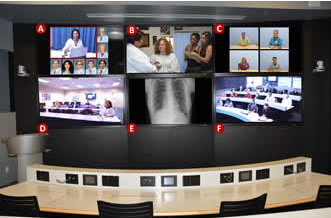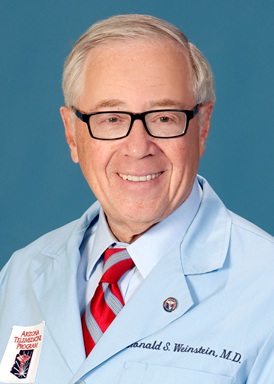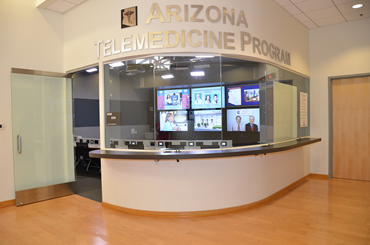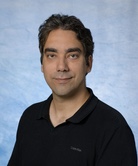T-Health Institute
The T-Health Institute was established by The University of Arizona, in 2003, as a Phoenix division of the Tucson-headquartered Arizona Telemedicine Program. Located on the Phoenix Bioscience Campus in downtown Phoenix, T-Health’s mission is to offer telemedicine and telehealth training programs, and to create “next-generation” innovations in education and healthcare delivery, especially those that leverage advances in medical informatics, wireless telecommunications, telemedicine/telehealth, simulation, and robotics. Dr. Ronald S. Weinstein, was the founding Director of both the Arizona Telemedicine Program (1996), and its T-Health Institute.
T-Health’s e-Classroom-of-the-Future
The T-Health Institute staff’s initial aim was to create and operate an Arizona healthcare “e-Classroom-of-the-Future.” What they created was the unique T-Health Amphitheater. This was recently upgraded to a High Definition video facility, offering leading edge video conferencing features.
Telemedicine, Telehealth, and Distance Learning Training Programs
The T-Health Institute and its parent organization, the Arizona Telemedicine Program, are widely known as national leaders in telemedicine and telehealth training. They offer telemedicine training programs that are fully accredited by the American Telemedicine Association. There have been over 1,000 trainees from over 100 healthcare organizations in Arizona that have taken these courses. In addition, the Arizona Telemedicine Program offers webinars on-line on creating clinical telemedicine programs and on individual telemedicine applications. Many healthcare distance learning seminars and lectures are available through the T-Health web page. Telemedicine instruction program modules, in English, and Spanish, are available on-line through the Arizona Telemedicine Program and T-Health web pages. The Arizona Telemedicine Program is also the parent organization for the federally-funded Southwest Telehealth Resource Center which provides training on telemedicine and support for independent telemedicine programs in Arizona, Colorado, New Mexico, Nevada, and the Four Corners region. There are a total of 12 federally funded regional Telehealth Resource Centers, covering the United States and its territories. In addition there are 2 national telehealth resource centers, the Center for Connected Health Policy and the National Telehealth Technology Assessement Resource Center.
Creation of the T-Health Amphitheater
Because of the urgent need to expand, and modernize the healthcare workforce to meet the growing demand for trained health care professionals, The University of Arizona received federal funds in 2003, to design, equip and staff its Institute for Advanced Telemedicine and Telehealth (T-Health Institute), a state-of-the-art telehealth education center headquartered in Phoenix. Dr. Weinstein, and Richard A. McNeely, Director of Biomedical Communications at the Arizona Health Science Center in Tucson wrote the initial proposal for federal funding. They were charged with the task of creating and designing the T-Health Institute, housing a state-of-the-art video conferencing facility, that would be housed in a 95 year old high school auditorium building in the heart of downtown Phoenix. This, and two other historic buildings, were about to be renovated and be part of a new University of Arizona healthcare campus. Earlier in his career, Dr. Weinstein, a Massachusetts General Hospital-trained pathologist and Harvard-trained cancer scientist, became interested in university technology transfer and began creating computer-based products for new companies. While chair of the Department of Pathology at Rush Medical School in Chicago, he co-founded several start-up companies. One company developed and commercialized one of the first IBM computer-based SAT Courses (1982). This was acquired by a major software company within two years. He then invented, patented and commercialized robotic telepathology (1989), accomplishments for which he became widely known as the “father of telepathology”. Today, there is worldwide interest in telepathology.
Dr. Weinstein welcomed the opportunity to create a next-generation electronic learning facility which would incorporate novel video social networking features, designed specifically to facilitate and enhance interprofessional education programs. The space for the new amphitheater had previously been the balcony area on the third floor of the historic Phoenix Union auditorium high school building. Dr. Weinstein, and his collaborator Richard A. McNeely, designed the highly innovative “T-Health Amphitheater”. This incorporated two novel video social networking platforms of Dr. Weinstein’s creation. In 2008, the T-Health Amphitheater design team received an international award (“2008 ComputerWorld 21st Century Award” for innovation in the Education and Academia category) for education facility design. Today, the T-Health Amphitheater in Phoenix serves as a video conference and distance learning hub for a variety of innovative education programs, developed on the T-Health platform.
Innovative Education Programs
The T-Health Institute is an engine for innovation in interprofessional education and practice training, and medical science education and health literacy programs, ranging from primary and secondary school medical science courses to life-long learning offerings for the general public. In the education innovation arena, the T-Health Institute’s staff is currently focused on developing: 1- Interprofessional Education and Practice (IPE) joint training programs for doctors, nurses, pharmacists, public health professionals, and the allied health professions; and 2- on the development and piloting of K-12 Sir William Osler medical science education programs, which are being developed to help address the national issue of the low level of health literacy in the general population in the United States.
Interprofessional Education and Collaborative Practice
T-Health Amphitheater offers video conferencing features designed specifically to facilitate communication among healthcare professionals. This includes access to innovative video social networking tools created by the T-Health staff.
The T-Health Institute has an excellent national reputation for innovation in Interprofessional Education and Practice training. The T-Health Institute and, its parent organization, the Arizona Telemedicine Program, organized and co-hosted the worlds’ largest Interprofessional Education and Practice (IPE) Conference (“Collaborating Across Borders III” or “CAB III”), held in Tucson, Arizona, November 19-21, 2011. There were 750 attendees from 11 countries. Plenary speakers were national and international leaders in the IPE field. There were over 380 presentations. Meeting abstracts have been published.
K-12 Medical Science Curriculum
With respect to primary and secondary school medical science curriculum development, Dr. Weinstein has been developing and implement his Sir William Osler K-12 medical science curriculum for over 30 years. Currently, the latest version of the Sir William Osler Medical Science coursework is being offered at two BASIS public charter schools in Arizona, as a trimester course for 8-9th grade students and a more advanced course for 12th grade students. Plans are underway to offer this medical science curriculum on-line in the future.
T-Health Institute and a Regional Resource
The T-Health Amphitheater is now a central hub of an Arizona statewide telemedicine-enabled “virtual campus’ that stretches all the way to Arizona’s California, Nevada, Utah, Colorado, New Mexico and Mexico borders. Facilities and network connectivity have been built out by the University of Arizona so that hundreds of on-campus and off-campus healthcare students from all of the healthcare disciplines, and faculty members working from dozens of sites, can be assembled electronically into multi-disciplinary interactive learning groups displayed on the large video wall in the T-Health Amphitheater. It is envisioned that off-site faculty members and students will meet with on-site students and faculty members in flexible work groups, for problem-based learning exercises and didactic lectures. The T-Health Institute has shattered traditional time-space barriers to interprofessional education through the conceptualization and implementation of innovative video conferencing techniques developed here in Arizona.
Vision for the Future
The T-Health Institute is strategically positioned to tackle some of the most challenging issues in healthcare education today. We expect the T-Health Institute to lead the way in breaking down barriers to educating interprofessional healthcare teams and retrofitting the healthcare workforce with advanced technologies and novel education roadmaps, in order to cope with the ever increasing demands for integrated healthcare services in the 21st Century. It is also seen as an imperative that standardized medical science curriculum be extended into K-12 schools in the future, to enable patients to take greater life-long responsibility for their own health. The T-Health Institute staff plan to help lead the way!

Video wall in T-Health Institute. Multi-site interprofessional team training in the T-Health Amphitheater (simulation).
A: Concept rendering of panel of 8 off-campus healthcare professors participating in the work-up of a telemedicine patient at a distant clinic.
B: Telemedicine patient sharing her medical history with her rural physician, on-site, and with 8 professors and the interprofessional group of students, including a medicine student, a nursing student, a pharmacy student and a public health student.
C: Student Interprofessional Team: Each quadrant accommodates a “Stack” of students from a single professional track, dialing in over the Internet from off-campus locations. Students and faculty members, physically present in the T-Health Amphitheater, can also electronically insert themselves into their professional education track-specific quadrant of the “quad”. For example, nursing students either off-site or physically present in the T-health Amphitheater will always appear in the upper right had corner of this video quad.
D: Students in classroom at UofA College of Medicine, Tucson Campus
E: Patient x-ray
F: Students in classroom setting at UofA College of Medicine, Phoenix Campus
T-Health Institute, "Classroom-of-the-future"
Institute for Advanced Telemedicine and Telehealth
The T-Health Institute, a division of the national award winning Arizona Telemedicine Program, was developed to create and operate an Arizona healthcare "Classroom-of-the-Future." Our T-Health Amphitheater is now complete and loaded with next generation video conferencing features.
Featured: Medical Science Education Innovation
Ronald S. Weinstein, MD, Unveils Flexner 3.0 Medical Science Curriculum at Johns Hopkins School of Medicine

Ronald S. Weinstein, M.D.
Founding Director (1996-2021)
(1938-2021)
“Flexner 3.0,” Dr. Weinstein’s latest invention, recalibrates health science education for the United States by repositioning “introduction to medical science coursework” from medical schools into K-12 schools. His Flexner 3.0 program also calls for reducing high school education by two years, and college and medical schools’ by one year each. Dr. Weinstein states, “It was an honor to be invited to introduce the Flexner 3.0 curricular model at Johns Hopkins School of Medicine, the institution that pioneered our current standard model for medical education. Click here to see more information about Flexner 3.0.
Click to Schedule a Tour

Exterior view of the Arizona Telemedicine Program’s T-Health Institute’s Amphitheater
on the campus of the Phoenix Biomedical Campus in downtown Phoenix, AZ
T-Health Institute Address:
600 E. Van Buren
Phoenix, AZ 85004

